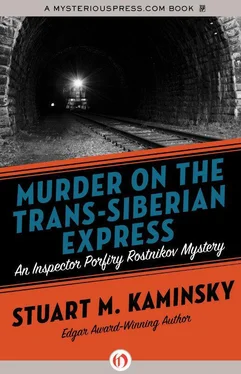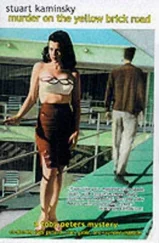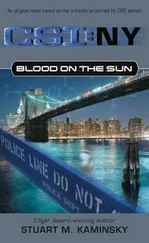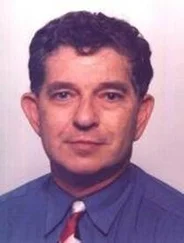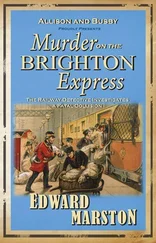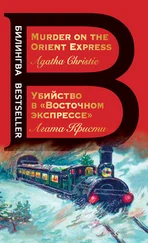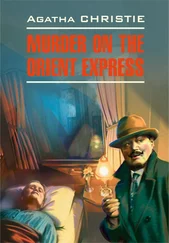Stuart Kaminsky - Murder on the Trans-Siberian Express
Здесь есть возможность читать онлайн «Stuart Kaminsky - Murder on the Trans-Siberian Express» весь текст электронной книги совершенно бесплатно (целиком полную версию без сокращений). В некоторых случаях можно слушать аудио, скачать через торрент в формате fb2 и присутствует краткое содержание. Год выпуска: 2012, Жанр: Полицейский детектив, на английском языке. Описание произведения, (предисловие) а так же отзывы посетителей доступны на портале библиотеки ЛибКат.
- Название:Murder on the Trans-Siberian Express
- Автор:
- Жанр:
- Год:2012
- ISBN:нет данных
- Рейтинг книги:3 / 5. Голосов: 1
-
Избранное:Добавить в избранное
- Отзывы:
-
Ваша оценка:
- 60
- 1
- 2
- 3
- 4
- 5
Murder on the Trans-Siberian Express: краткое содержание, описание и аннотация
Предлагаем к чтению аннотацию, описание, краткое содержание или предисловие (зависит от того, что написал сам автор книги «Murder on the Trans-Siberian Express»). Если вы не нашли необходимую информацию о книге — напишите в комментариях, мы постараемся отыскать её.
Murder on the Trans-Siberian Express — читать онлайн бесплатно полную книгу (весь текст) целиком
Ниже представлен текст книги, разбитый по страницам. Система сохранения места последней прочитанной страницы, позволяет с удобством читать онлайн бесплатно книгу «Murder on the Trans-Siberian Express», без необходимости каждый раз заново искать на чём Вы остановились. Поставьте закладку, и сможете в любой момент перейти на страницу, на которой закончили чтение.
Интервал:
Закладка:
The Yak had worked with and knew Vladimir Putin from the days when they had both been with the KGB in Leningrad, which was now St. Petersburg.
The Yak could have insinuated himself into a higher office but he had judged that his time had not yet come. Leaders fell too quickly. Patient and cautious bureaucrats survived.
And so he had asked for and been assigned the Office of Special Investigation which, under its former head, Colonel Snitkonoy, the Gray Wolfhound, had been largely ceremonial, that is before Rostnikov had been transferred to it from the Office of the Moscow Procurator.
The Wolfhound had been promoted to head of security at the Hermitage in St. Petersburg largely as a result of the success of the Special Investigation Office under Rostnikov. The Yak had stepped in with the goal of adding to his well-protected collection of incriminating tapes and documents while building his reputation as a man who could get things done without embarrassment.
Rostnikov and the Yak had a distinctly symbiotic relationship. The Yak protected Rostnikov-who often stepped on the boots or polished shoes of those in power-and Rostnikov and his team provided the Yak with a series of successes and connections to grateful victims and offenders.
And so, not wanting to put on tape the name that was before his son, Iosef, Rostnikov had written it out. Iosef Rostnikov, the most recent addition to Porfiry Petrovich’s team, had understood.
“Find what you can about her,” said Rostnikov, looking out the window at a man in a knee-length leather jacket, briefcase in hand, hurrying through the guarded iron gates below.
“She doesn’t want the children,” Iosef said.
“She says that she does” Rostnikov said, turning from the window and moving to his desk. There was only so long that he could stand on his metal-and-plastic left leg. It was far better in many ways than the withered one he had dragged around since he was a boy, but the lost leg had been like a crippled child. He could talk to that leg, urge it on, cajole it. This piece of alien material had no soul. Sometimes Rostnikov admitted to himself that he missed the pain of the lost limb. He could, of course, visit the leg whenever he wished. It resided in a large jar in-the second level under Petrovka in Paulinin’s laboratory, a jungle of books, jars, metal containers, tables, and equipment that might well have been antiques salvaged after the fall of the castle of Baron Frankenstein. That was the way Paulinin liked it, Paulinin who talked to corpses and collected their spare parts and assorted objects of metal, wood, plastic, and bone. It was widely believed that he had Stalin’s brain well hidden among the rubble. Rostnikovs leg was in good or bad company, depending on one’s view of Stalin.
At one point in his youthful zeal, Porfiry Petrovich had (as had most Russians) seen Stalin as a near God, a father, a man who deserved the name Man of Steel. Porfiry Petrovich had named his only child in honor of Stalin. Not many years afterward Rostnikov had regretted his decision, but his son had by then worn the name well.
The name on the sheet of paper before Iosef Rostnikov was “Miriana Panishkoya Ivanovna.” Miriana’s two young daughters, Laura and Nina, along with their grandmother, Galina, were now living in the one-bedroom apartment of Rostnikov and his wife, Sarah, on Krasnikov Street.
It had come about like this. Miriana had simply walked out on her children, leaving them with her mother. The grandmother, who was sixty-four years old at the time, had done her best for them on an insignificant pension and odd jobs. Then one day in a state bakery she had been turned away by the manager, a petty tyrant. The grandmother had begged for bread. The manager had grown loud and foul. The grandmother, in a state of confusion, had shot him with his own gun. The grandmother had gone to prison, and Rostnikov and Sarah had taken in the two girls while she served her time.
Now the girls’ mother was back.
“She wants money?” asked Iosef, pocketing the sheet of paper.
“That will be the next step,” said Rostnikov, seated but not wanting to settle in because it was nearly time for the morning meeting.
“And you shall refuse?” said Iosef.
“I shall tell her that it is her right to take the children and that your mother and I will miss them.”
“And she will walk away.”
“Perhaps with some help provided by you. If that fails, I will employ the law.”
Neither man needed to discuss what this meant. The laws of Russia were a shambles: a basis in old Soviet law, assumptions of common sense and vague precedents, smatterings of Western manipulations gleaned from reruns of “Law amp; Order,” “L.A. Law,” “Rumpole of the Bailey,” and ancient black-and-white episodes of “Perry Mason.”
The law, in short, was whatever the politically appointed and. frequently corrupt judges wanted it to be. While corruption and politics pervaded the old Soviet system, there were still occasional Communist zealots on the bench who stood behind and believed in the oppressive laws in the books they seldom read.
Now the law was written by Kafka.
Rostnikov would know how to use that law to rid himself of the suddenly returned mother. His concern was less with getting rid of her than in not adding to the weight of the world the two girls and their grandmother were already carrying. It was only in the past few months that the girls had begun to come out, to talk, to begin to smile and ask for small things.
Rostnikov finished the last of his coffee and rose, saying, “Shall we go?
Iosef rose and nodded.
Rostnikov picked up his notebook and with his coffee cup in hand followed his son to the door.
“Karpo and Zelach are not back?” Rostnikov asked as his son opened the door.
“No.”
“Then,” he said as they moved into the corridor, “perhaps it will be a short meeting.”
“We can hope,” said Iosef, walking next to his father.
“We’re Russians. It’s what we do best.”
There were three of them, two young men and a young woman. They were nude from the waist up. They were in one bed, looking up sleepily at the two odd men who had awakened them at the insane hour of eight in the morning.
“Which one of you is Misha Lovski?” asked the lean pale apparition in black slacks, tieless shirt, and jacket.
Karpo and Zelach had knocked at the door. They had heard the sound of tired voices inside the apartment. No one had come. They knocked again and waited. When there had been no answer, Karpo had nodded to Zelach, who adjusted his glasses and threw his shoulder against the door. The door flew open with a spray of wood chips and splinters.
Karpo had his weapon in hand as Zelach stepped to the side. In front of him in the single room cluttered with clothes, compact disks, empty liquor bottles, and full ashtrays was the bed with the trio under a blanket covered with cartoon figures of a fat man with a flowing white beard and a mass of wild hair.
The three in the bed should have been frightened. Perhaps they were, but the fear did not fully surface. To Emil Karpo they looked drugged, sleepy, and less than aware that life was a fragile thing.
“Misha Lovski?” Karpo repeated, putting his weapon back in the holster under his jacket.
The young man on the right side of the bed ran his hand across his shaved head and said to the ghostly figure in front of him, Cops?
“We are the police,” Karpo answered.
“We know no Misha Lovski,” the young man said, touching his bald head.
“He pays for this apartment,” Karpo said.
“The Naked Cossack pays for this apartment,” the young man said.
“Who are you?”
“Yakov Mitsin,” said Zelach. “Known as Acid. The Naked Cossack is the name of the lead singer and of the band. They are the Naked Cossacks.”
Читать дальшеИнтервал:
Закладка:
Похожие книги на «Murder on the Trans-Siberian Express»
Представляем Вашему вниманию похожие книги на «Murder on the Trans-Siberian Express» списком для выбора. Мы отобрали схожую по названию и смыслу литературу в надежде предоставить читателям больше вариантов отыскать новые, интересные, ещё непрочитанные произведения.
Обсуждение, отзывы о книге «Murder on the Trans-Siberian Express» и просто собственные мнения читателей. Оставьте ваши комментарии, напишите, что Вы думаете о произведении, его смысле или главных героях. Укажите что конкретно понравилось, а что нет, и почему Вы так считаете.
